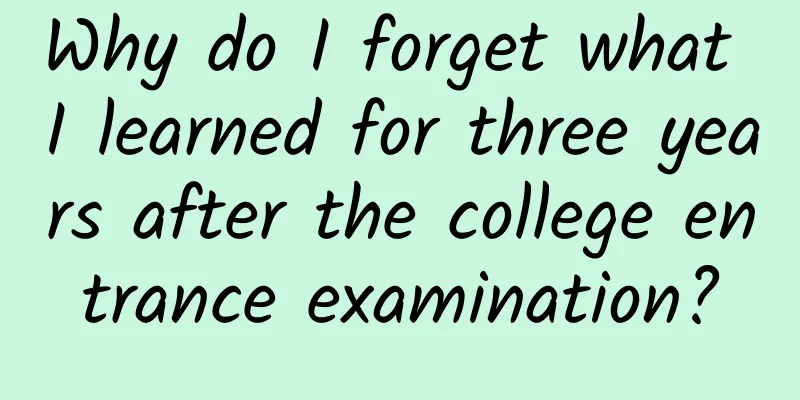Why do I forget what I learned for three years after the college entrance examination?

|
Written by | Yingge Editor | Calo Source: I am a scientist iScientist The late famous neurobiologist Oliver Sacks mentioned a sailor who was always 19 years old in his best-selling book "The Man Who Mistook His Wife for a Hat": Because of excessive drinking in his youth, which caused the hippocampus in his brain to shrink, the sailor suffered from amnesia. The time in his brain was "frozen" as a result: any new knowledge could only be saved for a few seconds or minutes, and then disappeared without a trace. For new acquaintances, he might forget who the other person was as soon as the other person finished introducing himself. Although his actual age was over 50, he still thought he was only 19 years old - he would be scared by himself in the mirror every day, and he didn't understand who the white-haired old man in front of him was. Even those who do not have this disease cannot escape the plunder of memory by the hand of forgetfulness. For example, among those who have just taken the college entrance examination, many people will soon find that those knowledge points that they have reviewed for a long time, those knowledge threads and difficult definitions that they can still remember clearly during the exam, can no longer be remembered not long after the college entrance examination. Sometimes, even when you pick up your notes and look at them again, you will feel that these knowledge points are like passers-by. I study → I take the test → I pass → I forget what I learned. Image source: blogspot.com In fact, except for some very rare people with hyperthymesia (such as Sheldon in The Big Bang Theory) or Savant Syndrome, most people cannot keep all knowledge in their brains forever. Forgetting is an important component of the memory system. No matter how much effort we put into remembering something, we still need to accept this fact. What kind of memory is forgotten knowledge? A typical learning and memory system consists of three stages: encoding, storage, and retrieval of memory. In addition, some memories will have some subsequent stages, such as forgetting and reconsolidation. For a long time, psychologists regarded the memory system as a single system until more and more evidence changed this understanding. American psychologist Larry R. Squire divided memory into the following categories according to duration, knowledge attributes, etc.: The shortest-lasting memory is sensory memory, which can briefly (milliseconds to seconds) store information from the visual, auditory and other sensory systems, such as images just seen and sounds just heard. Next is short-term memory, which can be stored in the memory system for a short period of time (seconds to minutes) - among them, short-term memory that is temporarily stored in the memory system in order to complete a certain behavioral task is called working memory. In real life, the most profound impact on our life, study and work is long-term memory, which can be stored for several years to a lifetime and is the cornerstone of our thoughts, personality, way of doing things and other behaviors. If long-term memory is personified, it can be seen as a pair of "brothers" with distinct personalities. The "older brother" is called explicit memory. He is knowledgeable and organized. Whether you need to recall the meaning of an English word, who is the author of a novel, or who attended a birthday party and what gifts were received, he can tell you in detail. In contrast, the "brother" implicit memory is like an elf that comes and goes without a trace: he may gently hold your hand and help you tie the knot when you tie your shoelaces (procedural memory), or make you subconsciously fear the TV screen after watching The Ring (classical conditioning); sometimes he may give you a preconceived impression of something through prior experience (perceptual priming), and sometimes he may make you habituate to repeated stimuli - and in the process of all these behaviors, you are completely unaware of his existence. Because the whereabouts of this "younger brother" are so erratic, when it comes to forgetting, people often focus on the "older brother" explicit memory, which can be roughly divided into two parts: semantic memory related to facts and episodic memory related to situations. From the binomial theorem to the conservation of mechanical energy, from redox reactions to the characteristics of the Mediterranean climate, the knowledge we have learned about the world belongs to the category of semantic memory. Some studies suggest that semantic memory appears earlier than episodic memory and is less likely to be forgotten. Classification of memories. Original image source: Luke Mastin Then why did I forget it after the exam? In most cases, knowledge is information that can be used to make a decision, complete an action, or become familiar with someone or something. Because acquiring knowledge determines how well an action is completed (such as how well you get on a test), knowledge can be classified according to its value. Taking the behavior of "exam" as an example, knowledge that can lead people to the optimal behavioral results, such as knowledge of Chinese, English, and mathematics, is beneficial knowledge; knowledge that will hinder the completion of the behavior, such as the knowledge needed to play computer games, is disadvantageous knowledge; and knowledge that will not have any positive or negative impact on the completion of the behavior regardless of whether it is mastered or not, such as Angelina Jolie's measurements, is useless knowledge. According to the theory of Shaul Markovitch and Paul D. Scott, forgetting refers to the phenomenon that knowledge in a memory system is lost or modified, thus affecting the completion of a certain behavior. In many cases, forgetting is actually the result of competition between new knowledge and old knowledge for storage space, which can be caused in two ways. One reason is the explicit forgetting mechanism, which is to purposefully expel some of the stored memories - just like erasing the wrong words with an eraser - so as to improve behavioral performance by removing the influence of negative memories and free up memory space. Another reason is implicit forgetting, which usually refers to the loss of old knowledge due to learning new knowledge, so it is also called concept drift. Concept drift often occurs because knowledge has become outdated and inapplicable, or behavioral needs have changed. For example, if you need to attend a meeting, the original time is scheduled for 2 pm, so you write 2 pm in your notebook; then, the meeting is temporarily postponed for an hour, so you change 2 pm to 3 pm, and the memory of "meeting at 2 pm" is immediately forgotten. According to the behavioral consequences of forgetting, forgetting can be divided into positive forgetting, negative forgetting and neutral forgetting. As the name implies, the result of positive forgetting is better behavioral performance, the result of negative forgetting is worse behavioral performance, and neutral forgetting has no effect on behavioral performance. It is not difficult to see that this classification method is directly related to the nature of knowledge mentioned above: for example, when useless knowledge is forgotten, neutral forgetting occurs; when beneficial knowledge is forgotten, negative forgetting occurs; when unfavorable knowledge is forgotten, positive forgetting occurs. Basic math? I don't remember. A line from a movie 4 years ago? It comes to mind. Is this you? Image source: pinterest.com Wait, how can learning and memorizing be so utilitarian? This is too bad! But if you analyze it carefully, the fact is that before the test, the beneficial knowledge is the content related to the test. In order to better complete the test, we need to perform positive forgetting, that is, suppress the disadvantageous knowledge. After the test, the needs have changed. Relaxing the tense mood and compensating for the lack of fun during the preparation period have become the main purpose. Therefore, playing games, reading novels, and learning skills unrelated to the test have become beneficial knowledge, while the previous beneficial knowledge has become disadvantageous knowledge or useless knowledge. In this way, the consequences are naturally obvious. Oh my god, can I remember it if I forget it? Don't panic. Even if a memory is forgotten, it doesn't mean it is gone forever. In many cases, even if you actively want to forget certain memories, these memory traces often cannot be erased completely. In the theory of memory forgetting, there is a large school of thought called the Motivated Forgetting Theory, which advocates that people often consciously or unconsciously forget unwanted memories. This theory can be traced back to Sigmund Freud, the founder of psychoanalysis, who proposed that many mental illnesses are caused by repressed and sexual memories. A study on PTSD suggests that although painful and disturbing memories occur in the subconscious, they are difficult to recall due to the active suppression of the parties involved, but they still remain in the memory system. This shows that active forgetting does not necessarily mean clearing the contents of the folder, but it is very likely that you have just lost the correct path to find these "files". Because memories with strong emotional colors are easily stored firmly in the memory system, they are difficult to erase. If you have left painful memories in things like solving math problems or memorizing ancient poems, they are not so easy to leave you. Of course, not all knowledge is accompanied by strong emotional colors - but even neutral knowledge is not so easy to be completely forgotten. We know that the imprints left by memories in the brain are related to the activation of certain specific neurons and neural networks. As long as these neural networks remain activated, the memory imprints will always exist; otherwise, the memory imprints will gradually fade. A theory called "Decay theory" advocates that memories will gradually fade over time. Some knowledge points are forgotten, perhaps because the neural networks related to those memories have not been activated for too long as the exam is far away. But as long as they have been activated, they can quickly become fresh through repeated reactivation and recall - psychology professors Harry P. Bahrick and Lynda K. Hall found that even if people have not been exposed to algebra for many years after graduating from high school, as long as they are given a re-class, they can easily recover their previous level. Passing the test is not the point There are always many theories of forgetting. As early as 1924, an interesting experiment was published in the American Journal of Psychology: the researchers asked the subjects to look at 10 meaningless syllables first, and then some of them fell asleep immediately, while the others spent some time according to their usual habits. The results of the subsequent memory test showed that those who fell asleep immediately recalled significantly more syllables than those who were awake - this may be because the awake people were more disturbed by the subsequent interference than those who fell asleep immediately. Based on this, the researchers proposed the "Interference theory", pointing out that subsequent learning behaviors may also interfere with and weaken people's original memories. If you really don't want to lament in the future, "Why did I forget all the knowledge points in high school?", you may make some adjustments according to different forgetting theories: for example, let the process of learning knowledge have a strong emotional color ("Ah! Mathematics, physics and chemistry! You are my only love!"), consciously strengthen the original memory traces through recall or review, or even take a nap immediately after learning something... But in the final analysis, it is more important to establish a long-term and effective learning purpose. If you learn knowledge just to get high scores in exams, then the life of this knowledge will end the moment the exam is over - because their favorable labels have been automatically replaced with useless or even unfavorable labels. If you learn knowledge in order to apply it in the future, cultivate rigorous scientific logical thinking ability and romantic liberal arts literacy, then they will always be beneficial to you and will not be easily forgotten. Image source: Apostle Son's "How to Use Superpowers Scientifically" References 1. Sean Mondesire and R. Paul Wiegand. Forgetting Classification and Measurement for Decomposition-based Reinforcement Learning. 2014. 2. Perner J, Ruffman T. Episodic memory and autonoetic consciousness: developmental evidence and a theory of childhood amnesia. 1995. J Exp Child Psychol 59: 516–548. 3. PJ Bauer, SS Wewerka. 1995. One- to two-year-olds' recall of events: The more expressed, the more impressed. Journal of Experimental Child Psychology, 59: 475–496. 4. Weiner, B. (1968). "Motivated forgetting and the study of repression". Journal of Personality 36 (2): 213–234. 5. Anderson, RS (1995). "An evolutionary perspective of diversity in Curculionoidea". Mem. Entomol. Soc. Wash. 14: 103–114. 6. Bahrick, HP; Hall, LK (1991). "Preventive and corrective maintenance of access to knowledge. Appl". Cognitive Psychology 5: 1–18. 7. Jenkins, JB; Dallenbach, KM. (1924). "Oblivescence during sleep and waking". Am. J. Psychol. 35 (4): 605–12. doi:10.2307/1414040. |
<<: 【World Oceans Day】Modern marine aquaculture model - mobile "deep sea granary"
>>: Diving into the deep sea 4000 meters, this unprecedented world is so exciting...
Recommend
Siri will be the highlight of Apple Developer Conference: it may open the interface and land on Mac
Apple's revenue fell in the first quarter for...
There are so many peppers in Jiangshan - Sichuan pepper, pepper, and chili pepper
People often say that "sour, sweet, bitter, ...
These 10 cognitions may be the gap between you and the UI designers of big companies
As UI design continues to gain popularity, althou...
Cancer screening for a disagreement? Only when these conditions are met can cancer screening be worthwhile
After Fanpu published "Some cancer screening...
The latest distribution of Android versions: Android Oreo has reached 4.6%
Google has released data on the distribution of t...
24-hour emergency response | All four missing investigators in Ailao Mountain, Yunnan have died
Hot News TOP NEWS The four missing investigators ...
The one in the friend circle is not you at all
You post pictures of delicious food you enjoyed w...
Between Meizu and Hammer, which one can better stick to its original idealism?
Speaking of the most "unique" brands in...
Was the disappeared ice field "giant horned monster" already picked up by a prehistoric cave "artist"?
In December 1994, French explorer Jean-Marin Chau...
BYD hopes that the weekly sales of U8 will exceed 300 units. The final appearance of a domestic player in the million-dollar luxury car club is of far-reaching significance.
On September 20 this year, BYD Yangwang U8 was of...
Sanlimi "100% Complete Case Transaction" 4 sections, 25 steps, 100 tricks for the whole case process, operation class
Sanlimi's "100 Complete Cases" cove...
Interesting fact: Why can’t humans synthesize vitamins?
Anyone who knows a little about biology knows tha...
Improper use of plastic wrap is toxic, harmful and may even cause cancer! 3 steps to teach you how to do it correctly
In the eyes of many people plastic wrap It is the...
What is word-of-mouth marketing? How can companies do word-of-mouth marketing well?
There are many ways of online marketing, such as:...









